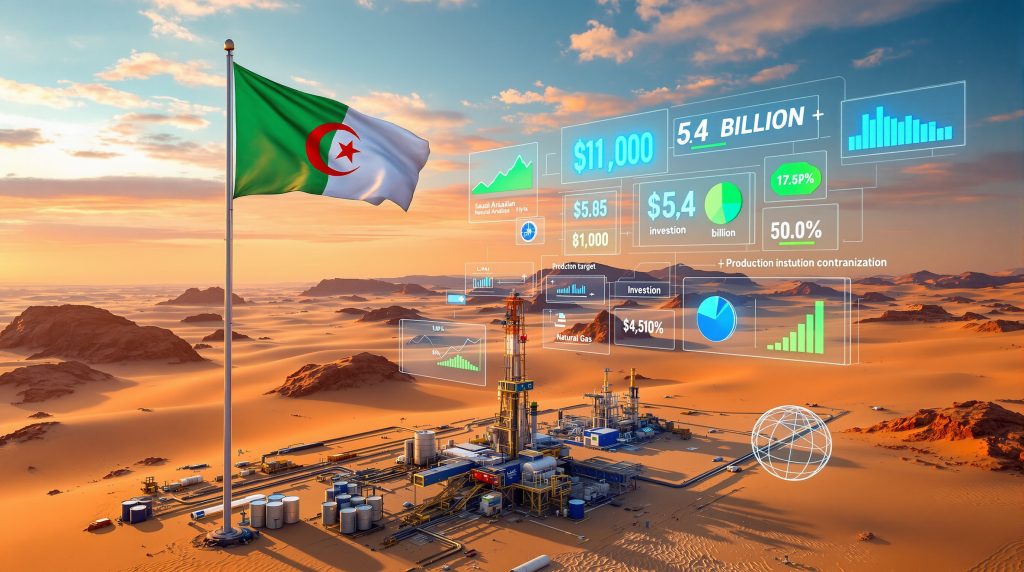Understanding Algeria's Strategic Energy Expansion
Algeria stands as one of North Africa's most significant energy producers, with its state-owned enterprise Sonatrach controlling vast hydrocarbon reserves that fuel both domestic needs and international markets. The Sonatrach oil and gas deal with Midad Energy represents a pivotal moment in regional energy development. The company manages approximately 4.7 trillion cubic metres of proven natural gas reserves, positioning Algeria as the world's 7th largest holder of natural gas resources according to BP Statistical Review of World Energy 2024.
Sonatrach operates as Africa's largest oil and gas company by production volume, generating roughly 40% of Algeria's government revenue while maintaining operations across exploration, production, refining, and distribution sectors. The enterprise has increasingly recognised that accessing advanced extraction technologies and substantial capital investments requires strategic international partnerships, particularly for developing previously underexplored regions like the southeastern Sahara.
Current production capabilities include managing over 50 oil and gas fields throughout the Saharan region, connected by extensive pipeline networks that transport resources to Mediterranean export terminals. This existing infrastructure provides a foundation for expanding operations into adjacent areas through partnerships that bring both financial resources and technological expertise.
How Does the $5.4 Billion Investment Reshape Regional Energy Dynamics?
The Sonatrach oil and gas deal with Midad Energy represents one of the most substantial private-sector energy investments in recent North African history. This partnership demonstrates growing international confidence in Algeria's regulatory framework and resource potential, particularly in southeastern regions that have received limited exploration attention in previous decades.
According to African Development Bank data, investments of this magnitude rank among the top five energy commitments in North Africa over the past decade. The scale suggests serious long-term commitment from international partners who view Algeria as a stable investment destination despite broader regional uncertainties.
Investment Structure Details:
• Total project commitment: $5.4 billion over 30-year period
• Initial exploration phase: $288 million allocated over 7 years
• Extension provisions: Additional 10-year development option
• Financing approach: 100% international partner funding during exploration
The investment compares favourably to other major North African energy developments. Libya's National Oil Corporation partnerships typically range between $800 million and $2 billion, while Egypt's Suez Canal Zone developments average $3-5 billion annually according to regional energy ministry data.
Large-scale energy commitments signal investor confidence in regulatory predictability and resource potential. However, the World Bank's Doing Business Report 2024 notes that North Africa remains moderately challenging for foreign investment, requiring continued improvements in contract enforcement and regulatory transparency.
What Geographic Advantages Does the Illizi South Block Offer?
Located in southeastern Algeria near the Libyan border, the Illizi South Block benefits from strategic positioning within the broader Saharan sedimentary basin. This geological formation extends across Algeria, Libya, and Tunisia, creating cross-border continuity in hydrocarbon-bearing rock formations that suggests extensive resource potential.
The project area sits approximately 100 kilometres south of In Amenas, a major gas production hub with established processing facilities and pipeline connections. This proximity provides several operational advantages that reduce development costs and accelerate production timelines, particularly relevant when considering natural gas forecast trends for the region.
Infrastructure Access Benefits:
• Processing facilities: In Amenas gas processing complex (400+ MW capacity)
• Pipeline networks: Existing routes to Mediterranean export terminals
• Power generation: Regional electrical grid and water treatment systems
• Transportation: Established road networks and logistics corridors
The location offers multiple pathways to international markets through the Trans-Mediterranean Pipeline infrastructure and potential access to Algeria's LNG export terminals at Arzew and Skikda. These connections provide flexibility for marketing different hydrocarbon products to European and Mediterranean customers.
Regional geology studies by the United States Geological Survey confirm that Saharan sedimentary formations contain proven hydrocarbon resources across national boundaries. The International Association of Sedimentologists has documented geological continuity that supports resource development potential in previously underexplored areas.
Which Production Targets Define Success for This Venture?
The partnership establishes ambitious production objectives designed to unlock substantial hydrocarbon resources over the contract duration. These targets reflect comprehensive geological assessments and advanced extraction methodologies planned for deployment throughout the development phases.
Resource Recovery Projections:
| Hydrocarbon Type | Target Volume | Market Position |
|---|---|---|
| Total Oil Equivalent | 993 million barrels | Major regional production addition |
| Natural Gas | 125 billion cubic metres | Significant European export potential |
| Liquid Hydrocarbons | 204 million barrels | Diversified product portfolio |
| LPG Component | 103 million barrels | High-value refined product market |
| Condensate | 101 million barrels | Premium pricing opportunities |
Resource recovery factors in Saharan basins typically achieve 20-40% of in-place reserves for conventional oil deposits and 60-80% for natural gas, depending on geological characteristics and extraction technology deployment. These industry benchmarks from the Society of Petroleum Engineers provide context for evaluating production feasibility.
The production timeline follows a structured approach beginning with comprehensive exploration and resource assessment, followed by initial development and production ramp-up, culminating in peak output optimisation over the contract's latter phases. An optional extension period provides flexibility for maximising resource recovery whilst considering broader oil price movements affecting project economics.
Disclaimer: Production targets represent estimates based on preliminary geological assessments and may vary depending on actual reservoir characteristics, market conditions, and operational factors.
How Does This Deal Strengthen Saudi-Algerian Energy Cooperation?
The partnership represents a significant milestone in bilateral relations between two major OPEC members, creating multiple strategic advantages for both nations. Saudi Arabia's Vision 2030 programme specifically targets $160 billion in annual non-oil revenues, with international upstream investment forming a core component of economic diversification strategies.
Saudi Aramco currently operates across 13 countries on four continents, demonstrating the kingdom's commitment to geographical diversification of upstream assets. This approach reduces portfolio risk while providing production flexibility for future market adjustments, according to the International Energy Agency's World Oil Outlook 2024. Furthermore, the Sonatrach oil and gas deal with Midad Energy aligns with these strategic objectives.
Strategic Benefits for Algeria:
• Access to advanced Saudi extraction and processing technologies
• Substantial foreign investment without increasing sovereign debt
• Enhanced production capacity in previously underutilised regions
• Strengthened position within OPEC production coordination
Strategic Benefits for Saudi Arabia:
• Diversification of international upstream portfolio
• Strategic presence in North African energy sector
• Alignment with Vision 2030 international expansion goals
• Proximity to Mediterranean and European energy markets
Both countries maintain OPEC membership with production quotas and strategic coordination responsibilities. Bilateral energy cooperation strengthens overall OPEC cohesion whilst providing individual nations with enhanced operational flexibility and technological advancement opportunities. However, understanding OPEC production impact remains crucial for evaluating this partnership's broader implications.
What Role Does Advanced Technology Play in Project Development?
Modern petroleum extraction increasingly relies on integrated technological platforms that combine artificial intelligence, automation, and real-time data analytics. The World Economic Forum's Future of Oil and Gas report indicates that operators deploying comprehensive digital systems achieve 20-30% improvement in production efficiency compared to conventional approaches.
Digital production monitoring systems typically reduce operational downtime by 15-25% in comparable projects, while enhanced recovery techniques increase total resource recovery factors by 10-20% according to Society of Petroleum Engineers technical documentation. Real-time optimisation platforms decrease operational costs by 8-12% based on Oil & Gas Journal technology surveys.
Technology Categories for Modern Projects:
• Digital Monitoring: IoT sensors, SCADA systems, real-time reservoir analysis
• Environmental Compliance: Emissions monitoring, water treatment, waste minimisation
• Enhanced Recovery: Pressure maintenance, smart well technology, production algorithms
• Data Management: Cloud computing, predictive maintenance, performance optimisation
Environmental compliance technologies represent increasingly important components of modern hydrocarbon development. Advanced flaring minimisation systems, comprehensive emissions monitoring, and sophisticated water treatment capabilities ensure operations meet evolving regulatory standards whilst maintaining operational efficiency.
Industry Insight: Technology integration creates measurable improvements in production efficiency, environmental performance, and operational cost management throughout project lifecycles.
The partnership likely includes technology transfer mechanisms typical of international joint ventures, including training programmes for local personnel, access to advanced reservoir management systems, and knowledge sharing on enhanced oil recovery techniques.
Why Is Local Content Integration Critical to Project Success?
Algeria's hydrocarbon law mandates meaningful local workforce participation and supply chain development, with government targets of 50-70% Algerian content in major upstream projects. These requirements reflect broader African Development Bank policies emphasising sustainable resource development that creates enduring economic benefits for host nations.
Major Saharan energy projects typically generate 1,500-3,000 direct jobs during development phases, with indirect employment multiplier effects ranging 2.5-4 times direct employment according to International Labour Organisation analysis. This job creation potential provides significant socioeconomic benefits for southeastern Algeria, a region with limited alternative economic opportunities.
Local Content Implementation Strategies:
• Skills Development: Technical training partnerships with Algerian universities
• Supply Chain Localisation: Preferential contracting for domestic suppliers (20-40% typical)
• Joint Ventures: Partnerships between international and Algerian companies
• Human Capital: Priority hiring for technical and management positions
World Bank research on resource development indicates that projects with strong local content integration demonstrate greater social licence to operate, more sustainable long-term economic benefits, and reduced operational disruption risks. The African Development Bank emphasises that technology transfer through local employment creates human capital benefits extending beyond individual project completion.
Community engagement initiatives ensure ongoing stakeholder support whilst building relationships that support long-term operational success. These programmes typically include infrastructure development, educational support, and economic development initiatives that benefit broader regional populations.
How Does This Investment Compare to Other Major North African Energy Projects?
Recent energy investments across North Africa provide context for evaluating the Sonatrach oil and gas deal with Midad Energy within broader regional development patterns. Several major partnerships demonstrate sustained international interest in North African hydrocarbon resources despite ongoing regional challenges.
Comparable Regional Developments:
• Libya's National Oil Corporation: Recent partnership agreements typically range $500 million-$1.5 billion per development
• Egypt's Red Sea Projects: EGYPC partnerships average $2-6 billion per field development
• Morocco's Offshore Exploration: International partnerships valued $400-800 million for exploration phases
• Tunisia's Onshore Development: Joint ventures typically commit $300-600 million over multi-year periods
European energy partnerships with Algeria focus heavily on natural gas supplies, with Algeria providing 8-10% of European imports through Mediterranean pipeline routes. Major European partners include Shell, Eni, and various electricity distribution companies seeking secure long-term supply agreements.
Chinese companies maintain significant presence across North African energy sectors, though investment patterns vary considerably by country and project type. Italian energy company Eni operates extensively in Algeria, including Berkine Basin developments that have evolved through multiple expansion phases since the 1990s.
The scale and structure of the current partnership reflect growing international confidence in Algeria's regulatory framework and resource potential. Long-term contract duration and substantial financial commitments suggest investor expectations of stable operational conditions throughout project development phases, particularly in the context of Saudi exploration licenses expanding internationally.
What Economic Impact Will the Project Generate for Algeria?
Substantial foreign investment creates multiple economic multiplier effects throughout host economies, particularly in regions with limited alternative industrial development. The partnership's economic impact extends beyond direct project employment and revenue generation to include broader infrastructure development and supply chain opportunities.
Direct Economic Benefits:
• Employment Creation: Jobs across exploration, development, and production phases
• Foreign Currency Earnings: Hydrocarbon export revenues supporting balance of payments
• Technology Transfer: Enhanced domestic technical capabilities and knowledge base
• Infrastructure Development: Regional transportation, communication, and utility improvements
At projected production levels, annual foreign currency earnings could reach several hundred million dollars based on current commodity pricing. These revenues support government fiscal positions whilst providing resources for broader economic development initiatives and social programmes.
Indirect Economic Stimulation:
• Auxiliary Industry Growth: Service sectors supporting project operations
• Entrepreneurial Opportunities: Local business development in logistics, catering, maintenance
• Government Revenues: Enhanced taxation and royalty income for public spending
• Regional Development: Economic diversification in southeastern Algeria
The International Monetary Fund notes that hydrocarbon revenues generate approximately 40% of Algeria's government income, making projects of this scale significant for national fiscal planning. Diversification of production sources reduces reliance on mature fields whilst providing operational flexibility for future market conditions.
Disclaimer: Economic impact projections depend on commodity prices, production levels achieved, and broader economic conditions that may vary significantly over project duration.
When Will Production Begin and Reach Peak Output?
The project follows a carefully structured timeline designed to maximise resource recovery whilst managing operational and financial risks. Development phases progress from initial exploration through resource assessment, infrastructure development, and ultimately peak production optimisation.
Development Timeline Structure:
• Phase 1 (Years 1-7): Comprehensive exploration and geological resource assessment
• Phase 2 (Years 8-15): Infrastructure development and initial production ramp-up
• Phase 3 (Years 16-30): Peak production operations and output optimisation
• Optional Extension: Additional 10-year period for resource maximisation
Initial exploration activities focus on seismic interpretation, well drilling, and reservoir characterisation to confirm resource estimates and optimise development planning. This phase requires substantial technical expertise and capital investment before any revenue generation begins.
Production ramp-up typically follows infrastructure completion and regulatory approvals for commercial operations. Industry experience suggests 3-5 year periods for achieving designed production capacity, depending on project complexity and market conditions.
Peak production phases aim to optimise resource recovery through advanced extraction techniques, pressure maintenance systems, and production enhancement technologies. Operational flexibility allows adjustment to market conditions and reservoir performance throughout the contract duration.
What Challenges Could Impact Project Success?
Several factors may influence partnership effectiveness and project outcomes over the 30-year contract duration. Risk management strategies address these potential challenges through contingency planning and adaptive operational approaches.
Operational Risk Factors:
• Regulatory Compliance: Evolving Algerian hydrocarbon laws and environmental standards
• Geopolitical Stability: Regional security conditions affecting operational continuity
• Market Volatility: Global energy price fluctuations impacting project economics
• Environmental Standards: Increasing requirements for emissions reduction and environmental protection
Regulatory frameworks continue evolving across North Africa as governments balance resource development with environmental protection and social development objectives. Project success requires ongoing adaptation to changing legal and regulatory requirements.
Technical and Commercial Challenges:
• Resource Performance: Actual reservoir characteristics may differ from initial assessments
• Infrastructure Limitations: Capacity constraints in transportation and processing systems
• Technology Evolution: Changing industry standards and operational best practices
• Community Relations: Maintaining positive stakeholder relationships throughout operations
Global energy markets experience significant price volatility that affects project economics and investment returns. Successful projects incorporate flexible operational strategies and financial structures that accommodate market uncertainty whilst maintaining long-term viability.
Climate change policies and international environmental commitments create evolving requirements for emissions reduction and sustainable operational practices. Projects must incorporate advancing environmental technologies and comply with changing regulatory expectations.
How Does This Deal Position Algeria in Global Energy Markets?
The partnership reinforces Algeria's strategic importance across multiple dimensions of international energy security and regional cooperation. Enhanced production capacity strengthens the nation's position within global supply chains whilst supporting domestic economic development objectives.
Mediterranean Energy Security Enhancement
Algeria's proximity to European markets through established pipeline networks makes increased production capacity valuable for regional energy security. The partnership contributes to supply diversity for European consumers seeking alternatives to other regional suppliers.
OPEC Influence and Production Flexibility
Enhanced resource base provides OPEC with additional production flexibility whilst strengthening Algeria's position within the organisation's strategic planning processes. Diversified production sources reduce reliance on mature fields and extend overall production capability.
Regional Energy Hub Development
The project supports Algeria's evolution as a regional energy hub connecting African resources to global markets. Infrastructure investments and technological capabilities developed through partnerships benefit broader regional integration initiatives.
Investment Destination Credibility
Successful completion of major international partnerships enhances Algeria's reputation as a preferred destination for energy sector investment. Positive track records attract additional international partnerships and technology transfer opportunities.
International energy markets increasingly value supply source diversity and long-term contract stability. Algeria's combination of substantial reserves, strategic location, and partnership-oriented approach positions the nation favourably for future international energy cooperation.
What Long-Term Implications Emerge for North African Energy Development?
This landmark partnership establishes important precedents for future resource development across North Africa, demonstrating successful models for international cooperation that balance commercial objectives with domestic development priorities.
Private-Sector Engagement Models
The partnership structure provides a template for large-scale resource development that attracts substantial international investment whilst maintaining national oversight and benefit sharing. This approach may influence similar agreements across the region.
Technology Transfer Framework Development
Successful knowledge sharing and capability building programmes create human capital benefits extending beyond individual projects. These frameworks support broader industrial development and technical expertise advancement across North African energy sectors.
Sustainable Development Integration
Environmental compliance requirements and community engagement initiatives demonstrate approaches for balancing economic development with environmental protection and social responsibility. These practices influence industry standards throughout the region.
Cross-Border Energy Collaboration
Regional cooperation patterns emerging from bilateral partnerships may evolve into broader multilateral frameworks supporting energy security and economic integration across North Africa and the Mediterranean region.
The Sonatrach oil and gas deal with Midad Energy represents more than a single project investment. It demonstrates Algeria's strategic approach to international energy cooperation whilst establishing operational and partnership models that may influence regional development patterns for decades.
Through strategic partnerships emphasising technology transfer, local content integration, and sustainable operational practices, Algeria continues strengthening its position as a critical player in global energy markets whilst supporting domestic economic development objectives that benefit regional communities and national development priorities. Moreover, effective investment strategy 2025 considerations remain vital for maximising returns from such substantial commitments.
Disclaimer: This analysis is based on publicly available information and industry benchmarks. Actual project outcomes may vary depending on market conditions, operational performance, and geopolitical factors that cannot be fully predicted at project initiation.
Ready to capitalise on energy sector opportunities before the market recognises their potential?
Discovery Alert's proprietary Discovery IQ model delivers real-time alerts on significant ASX mineral discoveries, instantly empowering subscribers to identify actionable opportunities ahead of the broader market. Begin your 30-day free trial today and secure your market-leading advantage by visiting Discovery Alert.




